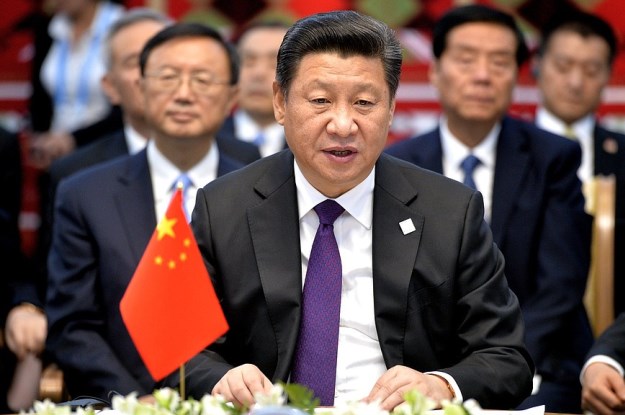For years, governments across the hemisphere have failed to halt Venezuela’s slow descent into strife-riven autocracy. This is partly because their discussions have overlooked an important element: Beijing’s key role as President Nicolás Maduro’s largest and most stalwart financial supporter. China as a political actor can no longer be left out of the search for solutions to Venezuela’s profound political and humanitarian crisis.
At a time when the government in Caracas is slowly turning into a pariah regime and several leading Venezuelan officials can no longer travel abroad due to international drug trafficking charges, Chinese investments have translated into tremendous political and economic influence. Opposition leaders have continuously promised to review the terms of Chinese loans, if they ever assume power, after Maduro adopted a series of questionable legal maneuvers to sign accords without congressional approval. Remarkably, these deals are no longer included in the yearly budget, making it impossible for the media or opposition politicians to assess them. Over the past few years, China has lent over $60 billion to Venezuela, most of which it pays back with oil shipments, and none of which includes policy conditions. The support does, however, provide privileges for Chinese companies in key sectors of the Venezuelan economy such as cars, telecommunications, appliances, and oil drilling, according to reports.
That is likely to further increase worries in China that an opposition victory in Venezuela would expose Beijing to the legal quagmire of having to renegotiate its deals. Indeed, while the public in Venezuela is largely unaware of China’s growing influence, that could radically change if the opposition came to power. The opposition in that scenario would be in dire need of external scapegoats while implementing painful reforms to overhaul the country’s distorted economic system. Creditors tend to be popular when they hand out cash in times of need, but less so when the debtor realizes the terms of the deal are too onerous. After all, Venezuela’s highly controversial oil payments to China have risen in recent years, even as Venezuela’s total oil output has been falling continuously for the past decade due to lack of maintenance and very limited new investments. In 2016, production decreased to a mere 2.5 million barrels per day, the lowest in more than two decades.
China, which contributed a staggering 39 percent to world economic growth in 2016, is extremely unlikely to play a visible role in any international effort to help Venezuela overcome its internal divisions. In most cases, such as those of Sudan, Zimbabwe, Myanmar and North Korea, where China has tremendous economic influence, policymakers in Beijing have resisted international calls to put pressure on authoritarian regimes. And yet the Chinese government, highly experienced in operating in difficult political environments, is known to have become more pragmatic when friendly authoritarian governments started to crumble. In an unprecedented move, Chinese diplomats met with Libyan rebels during the civil war in 2011, while Muhammar Gaddafi was still in power, to discuss future economic relations; Chinese foreign minister Yang Jiechi pointed out after the meeting that the opposition “has been increasingly representing the Libyan people.”
The fact that Beijing has not made similar comments about the Venezuelan opposition is a sign that, for now, it believes Maduro will be able to hold on to power. At the same time, rumors are rife that Beijing is increasingly impatient with growing delays in the shipment of crude oil – Caracas is said to be more than 3 million barrels behind schedule. Yet China will only stop supporting Maduro when it believes the cost – both economic and political – of doing so exceeds that of losing an ally in South America. Correctly assessing Beijing’s rationale – no easy task considering that Venezuela is one of the top ten oil suppliers to China – is indispensable to predicting how long Maduro will remain in power.
In this context, any high-level regional debate about the future of Venezuela should involve China – if not in the hope of active assistance, at least to better understand the views of all the key players involved in a crisis that has increasingly spilled into other countries, as seen by the growing number of Venezuelan refugees fleeing to Colombia, Argentina and Brazil. All affected countries should more actively discuss the Venezuelan issue in bilateral meetings with Chinese officials, and Brazil’s president should ask the Chinese government to include the topic in debates at the upcoming BRICS Summit in Xiamen.
This should be part of a broader strategy by Latin American policymakers to show China that its role in Venezuela matters to governments across the region, with potentially negative consequences for its image abroad – an issue Beijing cares far more about in Latin America after its at times tumultuous relationship with African governments.
Adapting to a more China-centric world is far from easy, yet China’s pivotal role in Venezuela is only a harbinger of things to come. Chinese trade with Latin America has grown more than 20-fold over the past 15 years. China’s President Xi Jinping announced that Chinese companies will invest a quarter of a trillion dollars in the region over the next 10 years, diversifying from traditional industries such as mining, oil and gas to areas like finance, agriculture and infrastructure (energy, airports, ports and roads) – this will inevitably enhance not only Beijing’s economic influence, but its political clout as well. For Latin America, managing the consequences of such developments may be daunting – but it is necessary.









